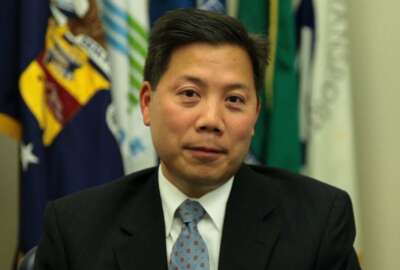
Hubbard Radio Washington DC, LLC. All rights reserved. This website is not intended for users located within the European Economic Area.
Hubbard Radio Washington DC, LLC. All rights reserved. This website is not intended for users located within the European Economic Area.
What might a Trump administration look like for federal managers? What would another Clinton in the Executive Office mean? Regardless of who wins the presidenti...
What would a Hillary Clinton victory mean for the federal workforce? Should procurement managers be excited at the prospect of businessman Donald Trump? Is another Clinton in the Oval Office a good or bad thing for senior executives? Are career staff justified in being anxious over logistics of a wall?
Neither campaign responded to a request for comment for this story, to specifically lay out their management priorities and federal workforce platform. But think-tankers, educators and former administration officials say to get those answers, it’s important to read between the lines of their words, their actions and their websites.
“It is very hard because neither candidate has had very much in the way of specific things to say about either management issues or the federal workforce in particular,” said Don Kettl, a professor at the University of Maryland’s School of Public Policy. “Trump has talked about things that give hints that he is picking up on some of the arguments Republicans have made, by trying to continue the efforts to downsize the workforce, move more in the direction of at-will employment. His arguments about what to do about the [Department of Veterans Affairs] have been focused on, for example, efforts to try to make it easier to fire employees who don’t perform well, to reward those who do, to create a hotline for citizens who want to call in with complaints.”
“One might suspect something like that coming from a Trump administration,” Kettl continued. “For Clinton, it’s a little bit harder to try to judge. She’s talked about valuing federal employees and she’s talked about the need to try to embrace a new series of policy initiatives. Because she’s been on the one hand very clear about literally hundreds of proposals, but not especially clear on a broad management agenda for carrying them out, it’s a little harder to judge in particular what this is going to mean.”
On Oct. 17, Trump released a 5-point ethics reform plan, which includes a 5-year lobbying ban on all executive branch employees after they leave federal service.
The plan directs Congress to pass campaign finance reform laws to block foreign lobbyists from raising money in American elections, and closes loopholes that allow former feds to use another name beside “lobbyist.”
Trump’s transition team includes lobbyists, but a POLITICO Playbook post says Clinton’s team has turned them away. Several media outlets have pointed out, however, that former Interior Department Secretary Ken Salazar — her transition team leader — is a partner with law and lobbying firm WilmerHale.
According to the Playbook post, a source familiar with the transition said Clinton hadn’t decided whether to uphold the Obama administration’s lobbying bans if she wins the election.
David Madland, senior fellow at the Center for American Progress Action Fund, said he expects the Clinton administration would be fairly similar to the Obama administration for federal employees — pushing for things like paid parental leave and perhaps pushing for pay raises.
Last month, Trump spoke on military readiness, “removing the defense sequester,” and eliminating government waste and improper payments.
“We can also reduce the size of the federal bureaucracy through responsible workforce attrition — that is, when employees retire, they can be replaced by a smaller number of new employees,” Trump said.
Trump’s campaign did not respond to a questionnaire from the National Active and Retired Federal Employees Association, which is asking for his position on federal benefits. Clinton’s campaign did respond, and in her answers — which were obtained by Federal News Radio, but will also appear in NARFE’s October magazine issue— said without fair pay, the government isn’t going to be able to recruit the “high-caliber employees it needs.”
“As President, I would work to ensure that federal employees are paid fairly, including by providing appropriate pay raises. And I will oppose arbitrary, across-the-board pay freezes, retirement cuts, or cuts to other employee benefits,” Clinton stated in her response.
In July, Reuters reported on Trump transition team director and New Jersey Governor Chris Christie telling a group of donors during a closed-door meeting, that the Republican candidate was drawing up a list of people to fire if he is elected.
Madland said it’s much harder to answer the question directly of what a Trump administration could mean for employees, but Madland also referenced Christie’s comments over the summer.
“From what [Christie] said, is that he wants to change the civil service laws to make it easier to fire federal employees,” Madland said. “He has run businesses for quite some time. Sometimes he has good relationships with his workers and sometimes he clearly doesn’t, and there are very adversarial relationships. You can also see that sometimes he’s really involved in the nitty gritty and sometimes he’s been very hands-off.”
Congress this year debated making it easier to hire and fire employees, as lawmakers grappled with reports of misconduct and misuse of power from employees at the management and senior executive levels.
One of the most talked-about departments was the Veterans Affairs Department, and both candidates have spoken out against the various scandals and called for more accountability.
“There’s a sense that criticism about the VA, the need to try to make the VA work better, the need to make sure the VA serves veterans better, but there hasn’t been in either case a very specific plan about how to go about doing that,” Kettl said. “It’s clear they’re going to have to be able to find ways of engaging in a fundamental transformation of the way in which the VA operates.”
Kettl said VA oversight is just one example of a recurring theme of this election, which is important issues that aren’t going away, that also don’t have a clear gameplan for being solved.
“The problems are not going to wait for a new administration to figure all that out,” Kettl said. “That’s where we find ourselves, that’s why the coming transition is going to be so absolutely critical.”
Roger Baker, former assistant secretary of Veterans Affairs for information and technology at the VA under the Obama administration, said despite the differences in the candidates and their campaigns, “realistically both are going to face the same kind of issues.”
What that comes down to, is that neither can address those issues, including ones like agency accountability, without skilled personnel. And the biggest problem facing both candidates as well as federal managers, is the demotivation and demoralization of the workforce.
“There’s going to be political battles between the administration and the Hill, that’s the way our democracy is built, that’s the way it should work,” Baker said. “From a career employee’s standpoint, the first thing the new administration has to do is make clear the new administration doesn’t demonize the career employees.”
Kettl predicted both candidates would not only face the same kind of issues, but likely take similar approaches to priorities like cyber issues, security leaks, background clearances, customer service, data sharing and procurement.
“There are other areas where one could imagine big differences, for example on regulatory policy, on the degree of attention to the workforce, movement on at-will employment, where there might be fundamental differences in the parties,”Kettl said. “But on the other hand, you can see probably similarities in the way in which either candidate would approach many of the fundamentals should they take office.”
Kettl said this election has been unique in that workforce policy has not really been discussed at all.
“The fact there’s been so little discussion about policy and so little discussion within policy on how to carry it out,” Kettl said. “If you’re a fed out there, it’s far harder than usual to figure out where all this is going to go.”
But federal employees aren’t flying blind into the election. At least according to Karen Evans, former administrator of the Office of Electronic Government and Information Technology at the Office of Management and Budget.
Campaign talk can range from completing taxes on the backs of postcards, to abolishing a federal agency, but Evans said the odds are those kinds of actions won’t actually happen.
“It’s one thing to campaign and it’s another thing to govern,” Evans said. “I think career people are seasoned enough when they hear this, they know that it’s campaign and their value is how they help that person who gets elected govern.”
Copyright © 2024 Federal News Network. All rights reserved. This website is not intended for users located within the European Economic Area.

